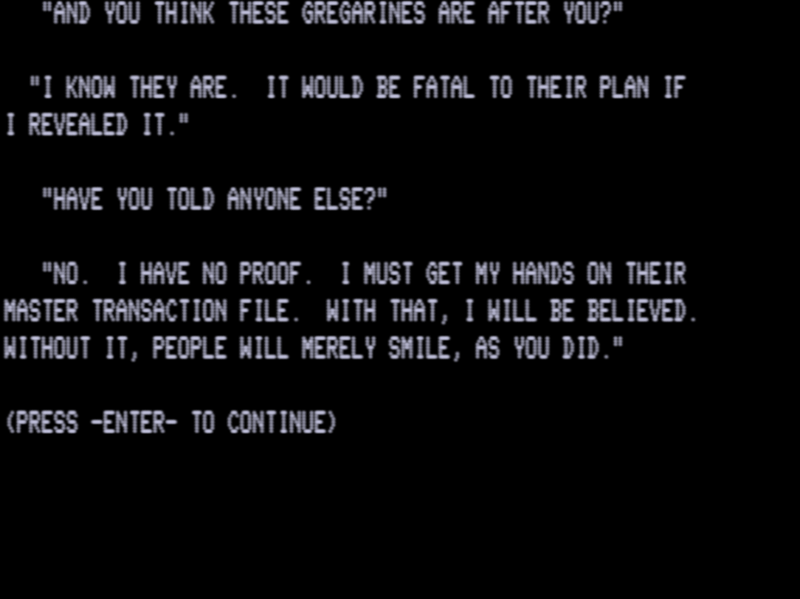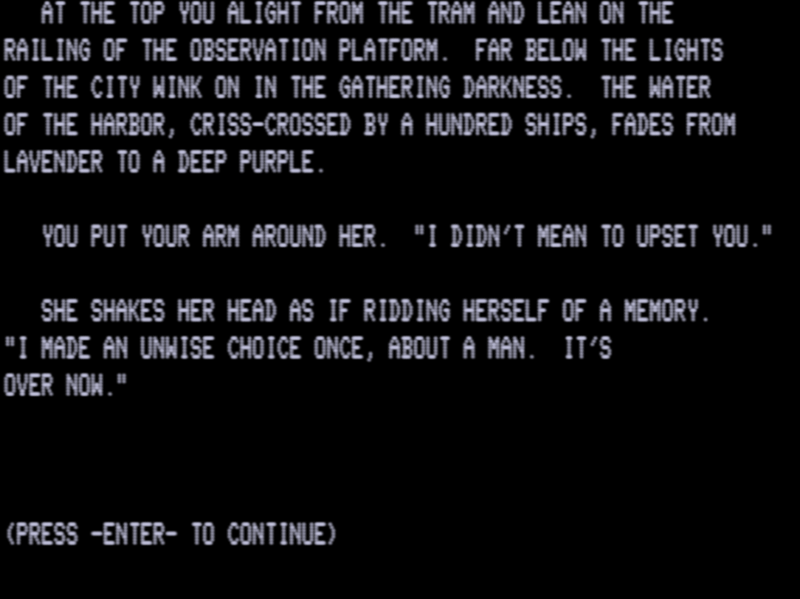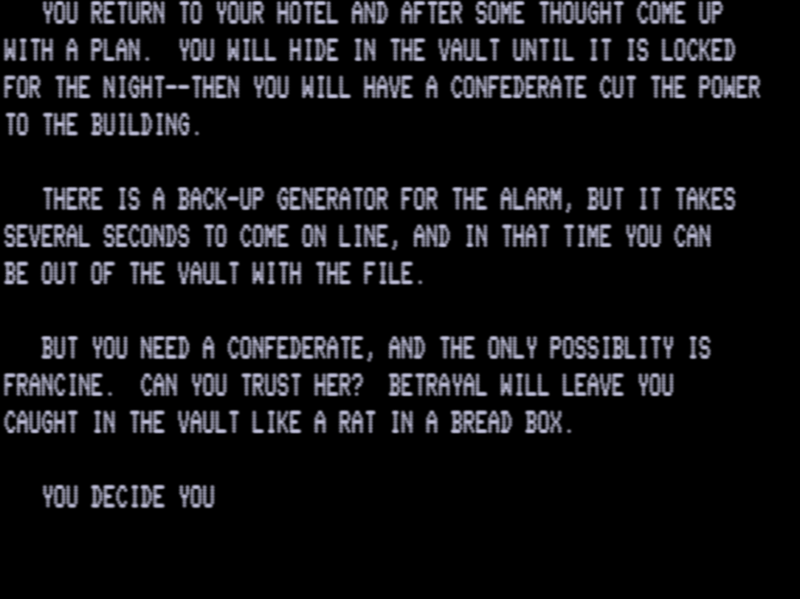
Opening screen for the Apple II version of the game. (Confirmed with an anonymous correspondent and the Hong Konger Jeremy Salkeld: that’s “Hong Kong” in fancy lettering.)
It was five years ago I starting playing through Robert Lafore’s self-proclaimed “interactive fiction”. It’s finally time to wrap things up with his last game.
To recap, he didn’t use a traditional parser, but rather his own keyword-searching setup that pretended to understand full input and encouraged role-play as part of the story. With his system he wrote:
Local Call for Death (mystery which includes investigating a room, stunningly good for 1979)
Two Heads of the Coin (Sherlock Holmes knockoff mystery)
Six Micro Stories (odd experimental collection of “short stories”)
His Majesty’s Ship ‘Impetuous’ (the Age of Sail, starts with a “puzzle” where you need to solve a dilemma unprompted)
For Dragons of Hong Kong, in order to adequately explain the premise I need to start with inflation in the 1970s. Seriously.

From the Museum of Computer Adventure Games.
In the 1972-1974 period in the United States both food and energy prices rose (there was a Saudi Arabian-led oil embargo on countries thought to support Israel in the Yom Kippur War) and a second food price hike kicked off more inflation from the 1978-1980 range. (There’s some mess in the early 1970s involving Nixon wage-price controls but I’m skipping over that.) The end result was an average inflation of 6.85% over the decade, eye-popping compared to the prior two decades (2.38 and 2.56 percent respectively) and at some points the inflation reached double digits. (For excessive detail, see Blinder, The Anatomy of Double-Digit Inflation in the 1970s.)
Inflation was bad enough during the decade that in 1974 there was a WIN (Whip Inflation Now) campaign led by US President Ford complete with novelty merchandise.

Image public domain.
When Ronald Reagan became president of the United States in 1981, inflation was near 10 percent, and credit for bringing it down goes mostly to Paul Volcker (chairman of the Federal Reserve System, appointed by Carter) who cranked the federal funds rate all the way to an eye-popping 20%, a level it has never been at before or since.
1981 is, of course, the year of our game, when not only the United States but a good chunk of the world had been inflation-weary for an entire decade. This helps explain the bizarre premise–
Professor Goodman, twice nominated for the Nobel Prize in Economics, has asked to meet you, (insert YOUR NAME HERE), in Big Al’s Bar to inform you of an important discovery.
“SO,” YOU SAY, “WHAT’S THIS ASTOUNDING DISCOVERY?”
“I’VE FIGURED OUT,” HE SAYS, LEANING INTENTLY ACROSS THE BOOTH TOWARD YOU, “WHAT’S CAUSING INFLATION.”

So the whole premise is: there is a secret society that worships money — the Gregarine Order — based on Hong Kong. They have found a way to manipulate markets causing excessive inflation. They have their own currency, the dogecoin Liroon, and their goal is to eradicate all other world currencies and substitute their own. They are led by an eeeeevil economist with an eyepatch, Akbar D’evile.

The professor also gets you to promise to send his nine-year-old niece a notification should anything happen to him, because her birthday happens in three days.
Immediately after telling you all this, and you agree or disagree to help go to Hong Kong, he dies via a jade dagger thrown at his heart. The people at the bar think you committed murder and you have to run away.
“DON’T GIVE US THAT. THE OLD GEEZER HAS A DAGGER IN HIS CHEST AND YOU’RE THE ONLY PERSON HEAR HIM.”
You then manage to “borrow” a passport from a friend in order to get a trip to Hong Kong in an attempt to clear your name.

Or you can end the game early here, which is kind of boring. Through all this you don’t get many choices — i.e. you can try to type something other than “RUN” to react to being accused of murder, but then you’ll just get annihilated by the bar patrons, so it isn’t really a “choice”.
Close to boarding, you remember about your promise regarding the professor’s niece, and the game lets you choose if you want to stop to send a letter or just board the plane to avoid the risk of missing a flight.
YOU STOP IN MID-STRIDE. WHAT ABOUT YOUR PROMISE TO THE PROFESSOR? THE LETTER TO HIS NIECE? IF YOU DON’T MAIL IT NOW, IT WON’T GET TO HER BY HER BIRTHDAY. YOU WOULD NEED TO BUY A CARD AND A STAMP, WRITE THE THING, AND FIND A MAILBOX. DO YOU HAVE TIME? THE TICKET MAN TOLD YOU TO HURRY–THE FLIGHT WAS ALREADY BOARDING. A PROMISE IS A PROMISE, BUT AFTER ALL, THE MAN IS DEAD, AND IF YOU MISS THE FLIGHT…
This is a gotcha-choice — similar the kind used in a lot of a Fighting Fantasy books at the time — if you choose wrong, you’ll lose in a future chapter. You have to send the letter. I’ll explain why later, but I do want to note the first time through I ended up choosing wrong just because the parser misinterpreted what I typed. Here’s the relevant source code:
5472 IFINSTR(I$,” STEW”)THENB$=”STEWARDESS”:GOTO5488
5474 IFINSTR(I$,”AGENT”)ORINSTR(I$,”TICKET”)ORINSTR(I$,”BOARDING”)ORINSTR(I$,”GATE”)THENB$=”TICKET AGENT”:GOTO5488
5480 IFNF=0AND(INSTR(I$,”WRITE”)ORINSTR(I$,”SHOP”)ORINSTR(I$,”STORE”)ORINSTR(I$,”BUY”)ORj
INSTR(I$,”NOTE”)ORINSTR(I$,”TURN”)ORINSTR(I$,”STAMP”)ORINSTR(I$,”MAIL”)ORINSTR(I$,”CARD”))THEN5500
5482 IFINSTR(I$,”KEEP”)0ANDINSTR(I$,”PROMISE”)ANDNF=0THEN5500
5486 GOTO5490
If your string contains any of the keywords mentioned (“BUY”, “MAIL”, etc) the game assumes you meant to send the letter, otherwise it skips on to “THE FLIGHT IS DELAYED BRIEFLY. YOU WOULD HAVE HAD PLENTY OF TIME TO WRITE, BUT IT IS TOO LATE NOW.” I typed SEND LETTER which, you’ll notice, is not caught by any of the source code lines above. I went ahead and rolled with it, but I just wanted to emphasize how risky the keyword approach is even when being quite thorough (it also seems extremely easy to have the command interpreted wrong the other way, with DON’T SEND MAIL having the word “MAIL” get snagged).
On the plane to Hong Kong you find yourself next to a young lady from Wyoming named Daisy Rae, on a missionary trip.

I should mention the game assumes male and hetero. You actually can choose to be female at the start but the game says “ALAS, THIS STORY HAS A RATHER MALE PERSPECTIVE. WE SUGGEST YOU ADOPT A MALE OUTLOOK AND A MAN’S NAME.” I think assigned roles and sexualities can work — the entire otome genre, for instance, assumes female main characters romancing male ones — but I found pretending there was an open choice followed by a forced reversal grating.
Upon landing, “YOU PASS THROUGH IMMIGRATION AND CUSTOMS WITHOUT INCIDENT AND SAY GOODBYE TO DAISY RAE” and note ominously that “SHE’S HIDING SOMETHING WITH THAT COWPOKE ACCENT, YOU THINK. YOU WONDER WHAT IT IS.”
This is followed by a choice between hotel room (Peninsula Hotel, expensive, Singapore Hotel, medium, YMCA, cheap); picking the Peninsula will lead to a game over later. This is followed by a meeting with a second potential romantic interest.

This is Francine Tang, a secretary for the Hong Kong and Shanghai Bank. You eat food and talk and as she leaves there’s another note of suspicion.
AS SHE TURNS TO LEAVE, HER LONG BLACK HAIR SWINGS ASIDE TO REVEAL, FOR AN INSTANT, A JADE EARRING ORNAMENTED WITH TINY GOLDEN DRAGONS.
Still no choices (other than the sending a birthday message one), just conversational roleplaying. You wander Hong Kong a bit (…hoping to find a secret society by luck, I suppose) and get your fortune told.

The middle paragraph differs if you’ve sent the birthday message. The last paragraph is supposed to be a clue for what to do during an event happening shortly.
Finally, you get to make a choice — you can call either Daisy or Francine the next day to spend time with them, and this also opens the opportunity for romantic choice (although, as you’ll see, it isn’t forced). Before plowing ahead with the plot — is this the first time this has happened in a computer game? That is, there is a choice of romantic partners, like many a visual novel? We can dip all the way back to 1930 with Consider the Consequences for this kind of choice in a printed book, but in electronic form?


Above is part of the trip with Francine. With Daisy Rae she confesses that the whole “missionary thing” is a way to get setup and she wants to get rich in Hong Kong
LISTEN–I WORKED IN A NEW YORK REAL-ESTATE OFFICE FOR SIX YEARS. I THINK I CAN GET RICH HERE.
As the scene ends, news of a typhoon rolls in. The protagonist, that is, you, decide to be less than cautious. (There is no choice here or even free-for text roleplaying, it just happens.)

Wandering the docks, you are approached by a man with a newspaper.
AS YOU STAND WATCHING THE WAVES A SHORT DARK CHINESE MAN APPROACHES YOU. HE IS CARRYING A FOLDED NEWSPAPER.
AT THAT MOMENT THE FIRST HARD GUST OF WIND SWEEPS ACROSS THE HARBOR. HIS NEWSPAPER IS BLOWN OPEN LIKE AN UMBRELLA,
AND SOMETHING CLATTERS TO THE SIDEWALK. IT IS A KNIFE WITH A JADE HANDLE, ENCIRCLED BY GOLDEN DRAGONS IN A LOVER’S KNOT.
Finally things pick up! …. and you get the choice to chase the assassin (who flees by boat) or make it to safety. If you take the action route, you find yourself dead.

I realize part of the setup with the fortune teller was to make the choice to chase a little more like solving a puzzle, but I have doubts any players would have made their plot choice on the basis of that.
So, a brief failed assassination, and back to romance. (Assuming you didn’t pick the expensive hotel to stay in — otherwise that’s when it’s game over, as you get deported back to the United States and convicted for the murder of the professor.)

I’m cutting out some moments, so this isn’t hurried or ridiculous, just it shares the issue with many Game Romances of feeling like a Setup rather than something natural and organic.
If you remember my writeup on Impetuous, there was a “third option” in an early moment in the game that was a puzzle of sorts. The game suggests “seduce” and “just friends” are the two only choices, but there’s a third one, where you instead proclaim your love.
4540 IFINSTR(I$,” LOVE”)ORINSTR(I$,” FALL”)ORINSTR(I$,”MARRY”)THEN4600
4550 IFINSTR(I$,” SEDUCE”)THEN4650
4560 IFINSTR(I$,” FRIEND”)ORINSTR(I$,”BACK OFF”)THEN4700
What makes this doubly interesting (if not great gameplay-wise) is that the reactions to Daisy and Francine are entirely different. Daisy only responds positively to “seduce” (if you try for “love” she responds “GOD WHAT A BORE MEN ARE.”); Francine, on the other hand, responds the best to “love”.
SHE SAYS NOTHING, BUT SHE REACHES ACROSS THE TABLE AND TAKES YOUR HAND, AND YOU SEE, DEEP IN HER OWN DARK EYES, AN ANSWERING FIRE.
After this scene, the next day our lovestruck/rejected protaganist decides that Akbar D’evile (the evil economist) must be at a special club for the rich.

I’m not sure where this leap of logic came from?
You find out that the US Undersecretary is visiting the club, and the Undersecretary happens to look a lot like you. So you (assuming you want to move this plot along and not just abort) decide to do some impersonation, and make it inside, where you are faced with a choice. Hope you remembered the description of D’evile from the start of the story!

This is after me typing my response, completing the sentence.
D’evile finds out your knowledge of world events is a bit lacking and becomes suspicious, and asks you “the password”. The first time through the game I had no idea the password, so quickly became mincemeat.
For the early-fatal-choice, at least the game was good enough to have the fortune teller warn us partway through the plot something was wrong. If you sent the message to the niece, you get a helpful response back in one of the earlier chapters:
SHE THANKS YOU FOR WRITING AND ADDS A PS: “UNCLE TOLD ME ONCE THAT HE HAD LEARNED THE GREGARINE PASSWORD–IT’S INFINITE INFLATION. I DON’T KNOW WHAT THAT MEANS, BUT MAYBE YOU DO.”
With INFINITE INFLATION, your imposter disguise holds, and you get an invite to the Gregarine HQ. Our goal now (which was in one of the screenshots earlier) is to get the MASTER TRANSACTION FILE. However, the file is in a vault that needs to be broken into at night, and you need a confederate.

The endgame here is a result of who your romantic interest is, and what choice you made with them. Both Daisy and Francine were spies for the Gregarines the entire time! If you pick SEDUCE with Daisy, James Bond style, Daisy will decide to turn against the Gregarine. If you pick something other than SEDUCE with Francine, the same thing happens.
“I COULDN’T HELP GOING TO BED WITH YOU, BUT I HATED MYSELF IN THE MORNING, AND I HATED YOU MORE.”
“CUT THE GAB,” SAYS D’EVILE, PRODDING YOU WITH THE GUN. “YOU’RE GOING FOR YOUR LAST RIDE.”
Assuming you handled the romance appropriately, you’ll be able to follow through with the vault plan, steal the master transaction file, have an opportunity to murder D’Evile (don’t do it, you’ll just get arrested), and escape to victory.

With the “friendship with Francine” ending, you get the sequence above, and find out Francine joined a Buddhist temple. If you went full romance with either character:
8560 A$=” YOU TWINE YOUR FINGERS IDLY IN HER LONG ”
8570 IFFF=0THENB$=”GOLDEN”
8580 IFFF=1THENB$=”MIDNIGHT”
8590 C$=” HAIR.
#YOU KNOW, #5, FAME AND GLORY ARE FINE, BUT YOU’RE THE ONLY THING THAT REALLY MATTERS TO ME.##OH, #1,# SHE SAYS BREATHLESSLY, AND MELTS INTO YOUR ARMS, LIKE A SCOOP OF ICE CREAM ON A WAFFLE-IRON.”

Another picture from the Apple II version of the game.
Well. I wish I could say the series ended on a strong note, but Impetuous was definitely the better game. Structurally, that game had an early puzzle — which made it explicit it was a puzzle, and one interesting to figure out — then branched based on choice of first officer in such a way that the same events occurred, but you had to choose differently based on the nature of the first officer. The “unimportant” roleplaying choices throughout (like remembering to say “sir” to a superior) felt nontrivial. This all led to a final naval climax where prior choices came into play.
The “choice of spies” for Dragons was meant to be analogous to the first officers, but structurally, the end result was a “puzzle” where you choose how seductive you want to be. The plot otherwise lagged terribly, with an assassination attempt over as soon as it began, and a main character who essentially just wanders Hong Kong with no direction for the majority of the action before getting the bright idea where to find D’Evile. The roleplaying was relatively weak — for example, Impetuous has a moment of freeform swearing right at the start of a battle, whereas this game has you make your choice of swear at character creation.
This felt to me like an evolutionary game, but where no games followed to continue the ideas. I can see the author trying new structures — let’s have the two characters like the previous games, but space out their interactions, and try to put some essential information the player must remember to keep them on their toes — and while they didn’t work, there was so little at this time to refer to, the concepts needed to be tried out first. I still hold that, especially given more modern advanced AI, there are paths to new forms of gameplay lurking here, and the innovations died (or at least, didn’t get picked up again until roughly 10 years ago) not just because of cultural inertia but because they were too early for the technology to handle them in a smooth way.
Let’s let Lafore (who went on to be a prolific writer of programming textbooks) have the last word (via Softline, September-October 1983):
What sort of people like interactive fiction? Hard to say. Perhaps people who are technofreaks but who are also interested in traditional literary forms. Some people think it’s sacrilege, using computers for literature. Of course, they’re the same people who think it’s sacrilege to use computers for anything.
Strangely enough, schools seem to be the most interested in our interactive fiction games. Both universities and high schools are using interactive fiction in creative writing courses—they find it can help a beginning writer start putting lines on paper—or on the computer. Once the student has talked back to a bunch of fictional computer characters for a while, he’s ready to start writing his own stories.
As to the future, it’ll be nice when voice recognition and speech synthesis become common enough to be applied to interactive fiction. And now that the interactive laser disk is with us, I don’t think it’ll be too long before we have interactive movies. Imagine: Pretty soon you’ll be able to play Bogart’s role in Casablanca—or just inject yourself into the story and slip off with Ingrid Bergman … make Shane come back … convince Dorothy to stay in Oz. I don’t think anyone can imagine where it will all lead.
What a resolutely madcap game, from the economic intrigue on down! Sad that we won’t be seeing more Lafore games.
What’s interesting is that there’s a mix of genuine Hong Kong features here, and some that’s obviously made up. Just to list all the ones I could spot:
The Peninsula Hotel is real, and there are a few YMCA branches, but I can’t find any reference to there having been a Singapore Hotel anywhere.
Feng Shui isn’t a direct fortune-telling technique, but rather a form of geomantics, that is to say the idea that one’s physical environment has predictable effects on one’s life. In its contemporary form, it’s not about giving specific predictions based on existing information, but rather about advising people on the colour of their furniture and the placement of pot plants, and so on. It’s also clear that Lafore didn’t check up on the Chinese elements system, which has five elements (Earth, Wood, Water, Fire, and Metal) rather than four as in the Greek-derived Earth-Air-Fire-Water scheme.
The ‘thieves’ market on Tsing Wah Street’ seems to be made up, as for one there isn’t a Tsing Wah Street! There is a Ching Wah Street but it’s basically entirely residential. But the tram up to an observation platform is real – the Peak Tram funicular.
So this seems to fall into the ‘did a bit of research but not a huge amount’ category.
Incidentally, has anyone actually tried using a jade knife? Jade is apparently decently hard on the Mohs scale but I don’t know if it’s necessarily tough enough to handle being stabbed at someone.
This is apparently a real one from the Shang dynasty. https://harvardartmuseums.org/collections/object/204593
Setting the thieve’s market on a fictional street instead of somewhere in the Kowloon Walled City seems like a terrible missed opportunity.
“is this the first time this has happened in a computer game? That is, there is a choice of romantic partners…?”
Wasn’t there a game (of the traditional parser/puzzle kind) that ended with your being able to choose the princess, some nearby male character, or both?
Oh yes! Castle (Wander system) did that.
Not *quite* the full dating sim scenario but I’ll still count that as a proto-version.
The first one! I couldn’t find it in your archives because of a guess the noun issue and a refusal to trust myself–I remembered “princess” but need to search for “damsel,” and I did vaguely remember that the alternative was a frog but I refused to believe it.
About this game, I do like “blue and about a size too big.”
I just realized that Hezarin also allows you to choose a romantic partner of your preferred gender; Voltgloss got the perfect-score ending in which it is stated that either a princess or a prince offers you their hand in marriage, presumably leaving which one up to your preference.
https://bluerenga.blog/2020/01/31/hezarin-the-end/#comment-66135
Of course the romance isn’t interactive even to the extent Castle was; you did interact with the characters earlier in their disguises as an orc and bear, but not with romance as an aim. And I’m not sure which came first, Hezarin or this (and they’re certainly unrelated).
As a game it seems pretty week, but I think they got the feel of “low-budget late-Moore-era-Bond made-for-tv rip-off” down pretty good. Villain with a physical defect. Villainess turned by the hero’s sexual prowess. Incomprehensibly weird villain plot. Exotic locale used mostly because the free trip there was what convinced the actors to work for scale. Odd aversion to spectacle. It ticks all the boxes.
It has a scent of Tribulations of a Chinaman in China. But less frantic and funny.
This has been a great series. The articles, I mean.
I reiterate my interest in modern adaptations of this games, now that at last we have voice recognition, improved and augmented in the Choice of games wisdom for structure and character agency.
Also I loved the author naivete thinking that technological advances were at the turn of the corner. A truly dreamer.
Thank for the writing!
Pingback: The Sands of Egypt (1982) | Renga in Blue
Pingback: Game #186: The Ancient Art of War (1985) – The Wargaming Scribe